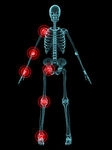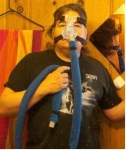Hey everyone,
I was just wondering if anyone else has chronic health problems stemming from sleep apnea. There is suggestion that liver disease, insulin resistance, peripheral neuropathy, autoimmune issues, heart disease and organ damage among other things can all be related to sleep apnea. My SA was diagnosed as CompSa severe. I am having liver issues, a yet to be pinned down immune problem and now border line diabetes and thyroid nodules. I am curious to know if any of you also suffer from health problems that can be traced back to apnea and if so has treatment irradicated those issues.
Audrey
Collateral Damage from SA
Collateral Damage from SA
_________________
| Mask: Mirage™ FX For Her Nasal CPAP Mask with Headgear |
| Humidifier: S9™ Series H5i™ Heated Humidifier with Climate Control |
God did not promise an easy journey but He did promise a safe landing.
-
davelikesbeer
- Posts: 250
- Joined: Tue Jun 21, 2011 11:45 pm
- Location: California
Re: Collateral Damage from SA
I actually wonder if OSA really is the cause of these things or is simply correlated. The things you listed are typically associated with obesity and obesity can cause OSA. Yes, I know not all OSA sufferers are obese and not people who are obese have OSA.Audge wrote:Hey everyone,
I was just wondering if anyone else has chronic health problems stemming from sleep apnea. There is suggestion that liver disease, insulin resistance, peripheral neuropathy, autoimmune issues, heart disease and organ damage among other things can all be related to sleep apnea. My SA was diagnosed as CompSa severe. I am having liver issues, a yet to be pinned down immune problem and now border line diabetes and thyroid nodules. I am curious to know if any of you also suffer from health problems that can be traced back to apnea and if so has treatment irradicated those issues.
Audrey
In your sentence, you say, "can be related" and I think that is 100% true since it does not imply cause and effect. However, I've not been convinced that SA causes these issues.
There is one exception. SA causes lack of energy during the day and lack of energy reduces the desire/ability to exercise, and the reduction of exercise can lead to weight gain. Also, I'm on the fence on SA affecting blood pressure and how it affects heart disease.
CPAP for the rest of your life.
Re: Collateral Damage from SA
Interesting study: Sleep Apnea Linked to Endothelial Dysfunction
_________________
| Mask: Swift™ FX Nasal Pillow CPAP Mask with Headgear |
| Humidifier: S9™ Series H5i™ Heated Humidifier with Climate Control |
| Additional Comments: Pressure is 11-14. Old CPAP was a Resmed S6 Lightweight. Also have Profile lite mask. ResScan is actually version 3.14. Now I use Sleepyhead. |
Re: Collateral Damage from SA
You are right--OSA is the cause, not the consequence, of a variety of very serious medical conditions.
Take obesity. There is evidence that the direction of causality is the opposite of what most people would guess. Sleep apnea causes obesity; obesity does not cause sleep apnea. It does this through the action of leptin, the hormone that controls among other things, the feeling of satiety. Several studies suggest that sleep deprivation reduces the amount of leptin, making us hungrier. Wikipedia has links to several studies.
^ Harsch IA, Konturek PC, Koebnick C, Kuehnlein PP, Fuchs FS, Pour Schahin S, Wiest GH, Hahn EG, Lohmann T, Ficker JH (August 2003). "Leptin and ghrelin levels in patients with obstructive sleep apnoea: effect of CPAP treatment". Eur. Respir. J. 22 (2): 251–257. doi:10.1183/09031936.03.00010103. PMID 12952256.
^ Seaborg, E (2007). "Growing evidence links too little sleep to obesity and diabetes". Endocrine News: 14–15.
There's also evidence linking transient ischemic attacks (mini-strokes) to sleep disorders. On the CPAP, the risk of stroke and TIA returns to normal. Several studies suggest that 70+% of people who have multiple TIAs have a sleep disorder.
The list goes on. Sleep apnea is causal in a number of devastating physical and psychiatric conditions. Keep doing your research and you'll find more.
This is a disorder that has pervasive effects on people's well-being and functioning. It basically disabled me until I got treatment, and I continue to struggle as I heal. My sleep numbers vary on a daily or weekly basis, and that affects me in unpredictable ways. I just don't know how I'm going to function, it depends on how well I slept.
Make no mistake, OSA is serious business.
Take obesity. There is evidence that the direction of causality is the opposite of what most people would guess. Sleep apnea causes obesity; obesity does not cause sleep apnea. It does this through the action of leptin, the hormone that controls among other things, the feeling of satiety. Several studies suggest that sleep deprivation reduces the amount of leptin, making us hungrier. Wikipedia has links to several studies.
^ Harsch IA, Konturek PC, Koebnick C, Kuehnlein PP, Fuchs FS, Pour Schahin S, Wiest GH, Hahn EG, Lohmann T, Ficker JH (August 2003). "Leptin and ghrelin levels in patients with obstructive sleep apnoea: effect of CPAP treatment". Eur. Respir. J. 22 (2): 251–257. doi:10.1183/09031936.03.00010103. PMID 12952256.
^ Seaborg, E (2007). "Growing evidence links too little sleep to obesity and diabetes". Endocrine News: 14–15.
There's also evidence linking transient ischemic attacks (mini-strokes) to sleep disorders. On the CPAP, the risk of stroke and TIA returns to normal. Several studies suggest that 70+% of people who have multiple TIAs have a sleep disorder.
The list goes on. Sleep apnea is causal in a number of devastating physical and psychiatric conditions. Keep doing your research and you'll find more.
This is a disorder that has pervasive effects on people's well-being and functioning. It basically disabled me until I got treatment, and I continue to struggle as I heal. My sleep numbers vary on a daily or weekly basis, and that affects me in unpredictable ways. I just don't know how I'm going to function, it depends on how well I slept.
Make no mistake, OSA is serious business.
- Captain_Midnight
- Posts: 761
- Joined: Sat Jan 28, 2006 8:10 pm
- Location: The Great State of Idaho
Re: Collateral Damage from SA
Audrey asks, in essence, whether many chronic diseases that are correlated with OSA are caused by OSA and can be treated by treating OSA.
Prof Icon has some excellent points, and I’ll suggest some additional reading for the excessively interested.
http://chestjournal.chestpubs.org/content/126/1/1.full
Inflammation and Obstructive Sleep Apnea Syndrome How Many Ways Do I Look at Thee?
http://pats.atsjournals.org/cgi/content/short/5/2/207
Obstructive Sleep Apnea and Metabolic Syndrome
"Chronic intermittent hypoxia and sleep fragmentation with sleep loss in OSA are likely key triggers that initiate or contribute to the sustenance of inflammation as a prominent phenomenon, but their complex interplay remains to be elucidated."
http://www.rtmagazine.com/issues/articl ... -06_04.asp
Obesity and Obstructive Sleep Apnea
The association between obesity and OSA is complex; metabolism and the endocrine system both play a role.
Mary L. Marzec, RPSGT
Yes, OSA causes many sequela secondary to the breathing disorder.
Regarding whether treating the OSA treats the secondary issues? The answer is a bit more illusive, but for some things (hypertension for example) in many cases yes.
. Good luck with the xpap therapy!
.
Prof Icon has some excellent points, and I’ll suggest some additional reading for the excessively interested.
http://chestjournal.chestpubs.org/content/126/1/1.full
Inflammation and Obstructive Sleep Apnea Syndrome How Many Ways Do I Look at Thee?
http://pats.atsjournals.org/cgi/content/short/5/2/207
Obstructive Sleep Apnea and Metabolic Syndrome
"Chronic intermittent hypoxia and sleep fragmentation with sleep loss in OSA are likely key triggers that initiate or contribute to the sustenance of inflammation as a prominent phenomenon, but their complex interplay remains to be elucidated."
http://www.rtmagazine.com/issues/articl ... -06_04.asp
Obesity and Obstructive Sleep Apnea
The association between obesity and OSA is complex; metabolism and the endocrine system both play a role.
Mary L. Marzec, RPSGT
Yes, OSA causes many sequela secondary to the breathing disorder.
Regarding whether treating the OSA treats the secondary issues? The answer is a bit more illusive, but for some things (hypertension for example) in many cases yes.
. Good luck with the xpap therapy!
.
_________________
| Machine: DreamStation Auto CPAP Machine |
| Mask: ComfortGel Blue Nasal CPAP Mask with Headgear |
| Additional Comments: APAP range = 10 - 12.5 In H20 |
Re: Collateral Damage from SA
I've heard SA can lead to congestive heart failure, stroke, diabetes.
Anything that decreases the O2 levels ain't gonna be body-friendly.
Anything that decreases the O2 levels ain't gonna be body-friendly.
Thinking of quitting CPAP?
No problem, here's the first thing to do when you quit:
Advanced funeral planning. When you give up CPAP, you'll probably need it.
No problem, here's the first thing to do when you quit:
Advanced funeral planning. When you give up CPAP, you'll probably need it.
Re: Collateral Damage from SA
Well said! My sleep doctor told a seminar that studies on medical student volunteers who were deprived of sleep for 5 days showed symptoms of fibromyalgia and also insulin resistance. Doing the fibromyalgia study with superb athletes only, did not develop the symptoms. So, apparently sleep apnea can make fibromyalgia worse but being in superb shape (not likely if you have sleep apnea) is protective.lcosborn wrote:You are right--OSA is the cause, not the consequence, of a variety of very serious medical conditions.
Take obesity. There is evidence that the direction of causality is the opposite of what most people would guess. Sleep apnea causes obesity; obesity does not cause sleep apnea. It does this through the action of leptin, the hormone that controls among other things, the feeling of satiety. Several studies suggest that sleep deprivation reduces the amount of leptin, making us hungrier. Wikipedia has links to several studies.
^ Harsch IA, Konturek PC, Koebnick C, Kuehnlein PP, Fuchs FS, Pour Schahin S, Wiest GH, Hahn EG, Lohmann T, Ficker JH (August 2003). "Leptin and ghrelin levels in patients with obstructive sleep apnoea: effect of CPAP treatment". Eur. Respir. J. 22 (2): 251–257. doi:10.1183/09031936.03.00010103. PMID 12952256.
^ Seaborg, E (2007). "Growing evidence links too little sleep to obesity and diabetes". Endocrine News: 14–15.
There's also evidence linking transient ischemic attacks (mini-strokes) to sleep disorders. On the CPAP, the risk of stroke and TIA returns to normal. Several studies suggest that 70+% of people who have multiple TIAs have a sleep disorder.
The list goes on. Sleep apnea is causal in a number of devastating physical and psychiatric conditions. Keep doing your research and you'll find more.
This is a disorder that has pervasive effects on people's well-being and functioning. It basically disabled me until I got treatment, and I continue to struggle as I heal. My sleep numbers vary on a daily or weekly basis, and that affects me in unpredictable ways. I just don't know how I'm going to function, it depends on how well I slept.
Make no mistake, OSA is serious business.
EPAP min=6, EPAP max=15, PS min=3, PS max=12, Max Pressure=30, Backup Rate=8 bpm, Flex=0, Rise Time=1,
90% EPAP=7.0, Avg PS=4.0, Avg bpm 18.3, Avg Min vent 9.2 Lpm, Avg CA/OA/H/AHI = 0.1/0.1/2.1/2.3 ... updated 02/17/12
90% EPAP=7.0, Avg PS=4.0, Avg bpm 18.3, Avg Min vent 9.2 Lpm, Avg CA/OA/H/AHI = 0.1/0.1/2.1/2.3 ... updated 02/17/12













